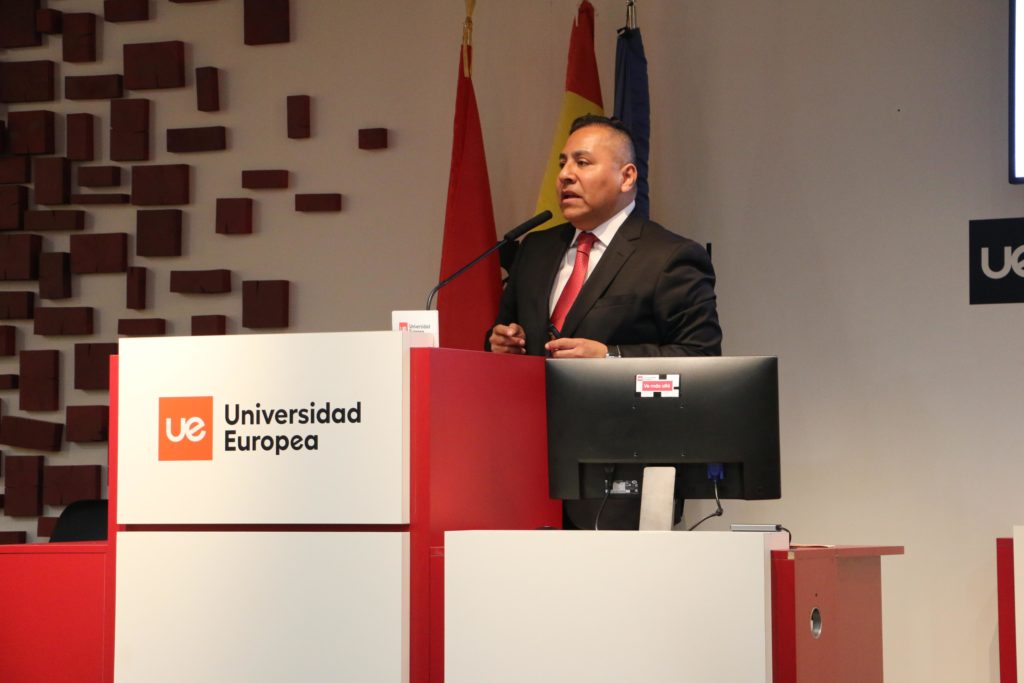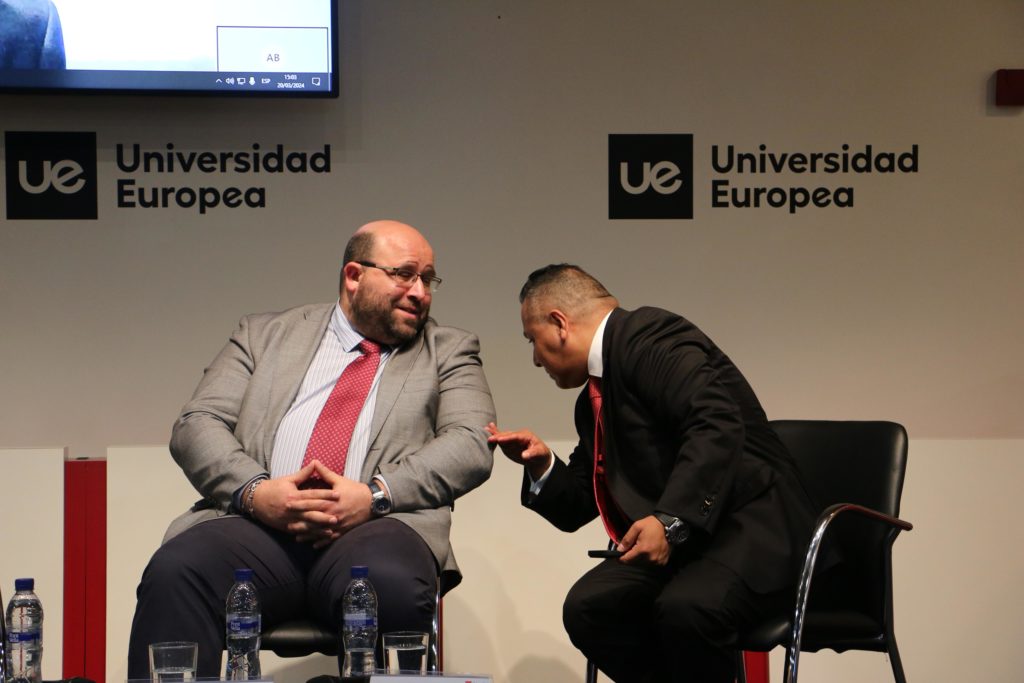Adrián Jiménez, Athanasios Nikitaras, Sebastián Rojas, Javier Arias
The answer to what the world would be like without criminology was provided on March 20, 2024, in Auditorium B of the Universidad Europea de Madrid, by Dr. Julio Ballesteros Sánchez, Dr. Dino Carlos Caro Coria, Dr. Daniel Sansó-Rubert, and as moderator, Professor of Criminal Law at the Universidad Europea, Mrs. Mónica de la Cuerda Martín, in a talk on «criminal law as a regulatory instrument for coexistence in a context of tension.»
Would be like a world with uncontrollable dictators, murders, kidnappings, and the world suffering from pressure. The response to «the boot of the dictators» is criminology and transitional justice, as Dr. Dino Carlos Caro Coria has stated, giving us examples of military crimes in Latin America. «In Chile and Argentina, they literally threw politicians out of an Air Force plane,» he declared, reminding us of the case of the Mothers of the Plaza de Mayo in Argentina, where women asked about their children who were kidnapped. Many of them never learned the fate of their loved ones. «Now they are the grandmothers of May, because they still have not found their children, many of whom were given to other families.» Furthermore, the Argentine dictator, Jorge Rafael Videla, and the rest of his accomplices were sentenced to life imprisonment for 504 kidnappings; their conviction never would have happened without criminology.
To justify hard-handedness, governments say they are fighting terrorists. «But I can’t call a dead person or a fugitive a terrorist,» said Dino Carlos Caro Coria. «Many times, they are people who have disappeared,» he added. Right now, we have the case of Nayib Bukele, current president of El Salvador, who – as the speakers have declared – has been beneficial for the country in the short term, but «we already know where this can end,» said Dr. Daniel Sansó-Rubert. «The situation in El Salvador is bread for today and hunger for tomorrow.» «Hard-handedness didn’t work, for example, in Colombia in the case of Escobar; the social cost is much greater. There are people in jail just because they have a tattoo,» added Dr. Daniel Sansó-Rubert. However we should consider that «the military chief doesn’t shoot, his soldiers do. There is a chain of 5 to 10 people; the soldier doesn’t communicate with the one giving the order,» something that is very important for judges, to consider the existence of the chain of command, as Dr. Dino Carlos stated.

Criminology in modern times can be part of the state, along with private companies. Professor Julio Ballesteros from the University of Salamanca delved into the topic of corporate crime, highlighting the increasing influence of military and security companies in contemporary society. «Companies play a pivotal role,» Julio Ballesteros told us.
Nowdays we are facing an economic war; «companies are going to be protagonists in conflicts, gray warfare, installation,» Ballesteros continued. «Economically, companies are very well positioned. The economic capacity of large companies can exceed that of countries 5 or 6 times, sometimes even European ones.» Dr. Julio Ballesteros also talked about the money a private company can invest in artificial intelligence and how its technology is important for modern wars. «Elon Musk’s satellites were protagonists in the invasion of Russia in Ukraine,» he noted. But it’s not just technology; there are also paramilitary groups, such as the Houthis in Yemen, who have the support of private companies, which give them money and materials to continue their fight. «There are companies that have helped jihadists. They put weapons in the hands of untrained people or ex-military,» Ballesteros recounted. «In this environment, companies are special protagonists in conflicts.»

He addressed the critical role of the pharmaceutical sector during the COVID-19 pandemic, warning about the possibility of profit prevailing over public health in the future. He also mentioned the issue of companies extracting resources controversially, as in the case of water extraction for avocado cultivation in Chile to meet market demands. However, he highlighted that many of these companies and situations are not backed by criminal law, limiting the legal actions that can be taken regarding them. These points raised by Ballesteros reveal the complex intersections between companies, security, profit, and social welfare in modern society.
The answer to what the future will be like was provided by Dr. Daniel Sansó-Rubert, saying that «criminology can regulate the private sector» because there is a risk of creating a private army in the future, although it is important to understand the difference between mercenaries and the privatization of conflict. That is, right now, there are paramilitary groups, and no one controls them; «there is anomie,» and still «we lack knowledge,» said Dr. Sansó-Rubert, showing us visions of a future full of doubts and problems which awaits us.
